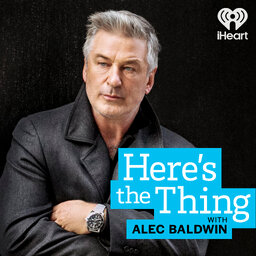Chris Rock and Herb Alpert
Chris Rock is one of the greatest comic talents in the world, but when he arrived on Broadway to perform his first play, The Motherf***ker in The Hat, he did not yet know how to properly cross a Broadway stage. Rock says that his life has mimicked each role in the play—both the heart-breaker and the heartbroken—and he tells Alec that performing in the show was the hardest thing he has ever done.
When Herb Alpert started playing trumpet with his band Tijuana Brass, Woody Allen and George Carlin were the opening acts. In 1966, The Brass outsold The Beatles. Alpert went on to co-found A&M Records, where he identified and signed some of the industry's greatest talent: The Carpenters, The Police, and Cat Stevens. He and his partner sold A&M in 1989 for half a billion dollars. He says he’s looking for the same thing as everybody else—a life of purpose and meaning.
Learn more about your ad-choices at https://www.iheartpodcastnetwork.com
In 1 playlist(s)
Here's The Thing with Alec Baldwin
Award-winning actor Alec Baldwin takes listeners into the lives of artists, policy makers and perfor…Social links
Follow podcast
Recent clips

Karina Canellakis - from Violinist to Conductor
47:32

From the Archives: Anjelica Huston on Modeling, Movie-Making, and a Life in the Spotlight
48:25

The Fearless Robbie Kaplan
42:32
 Here's The Thing with Alec Baldwin
Here's The Thing with Alec Baldwin